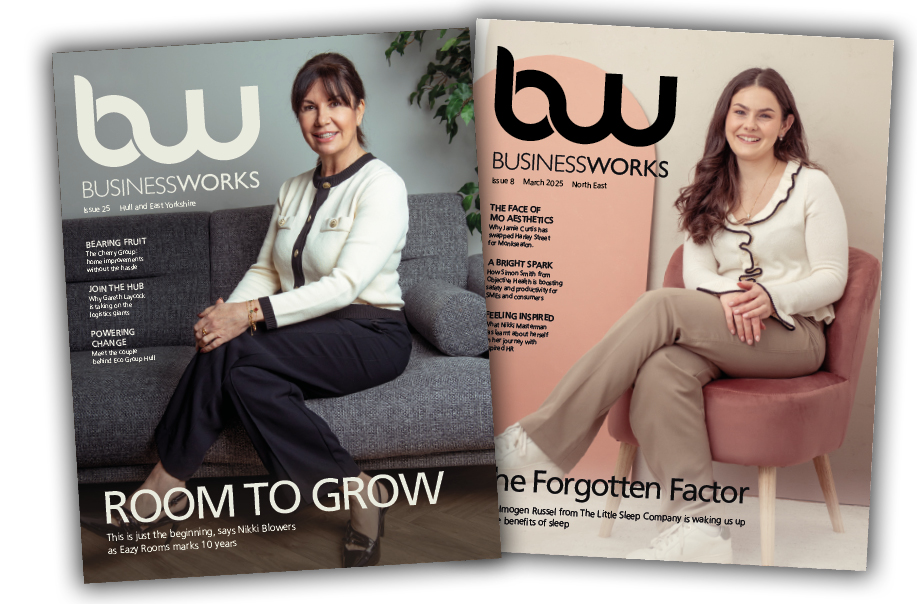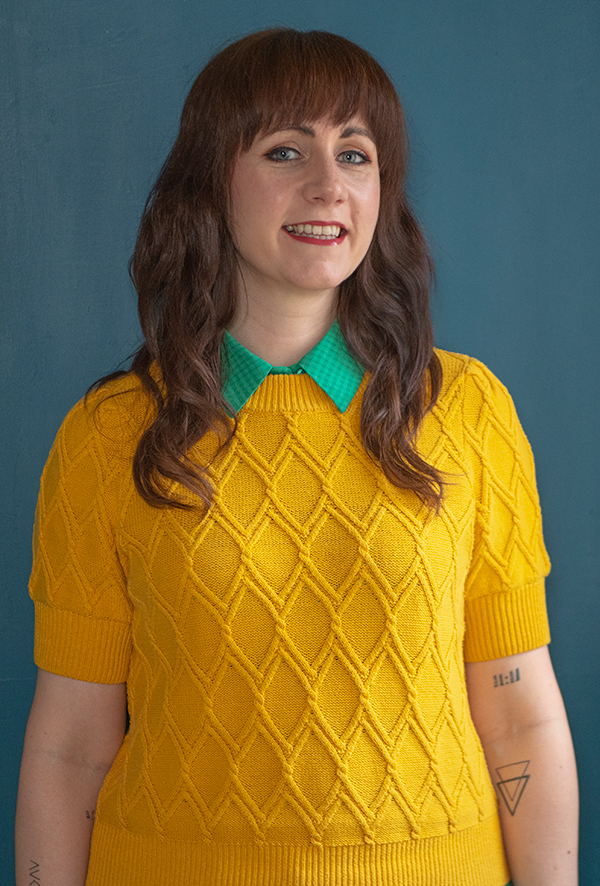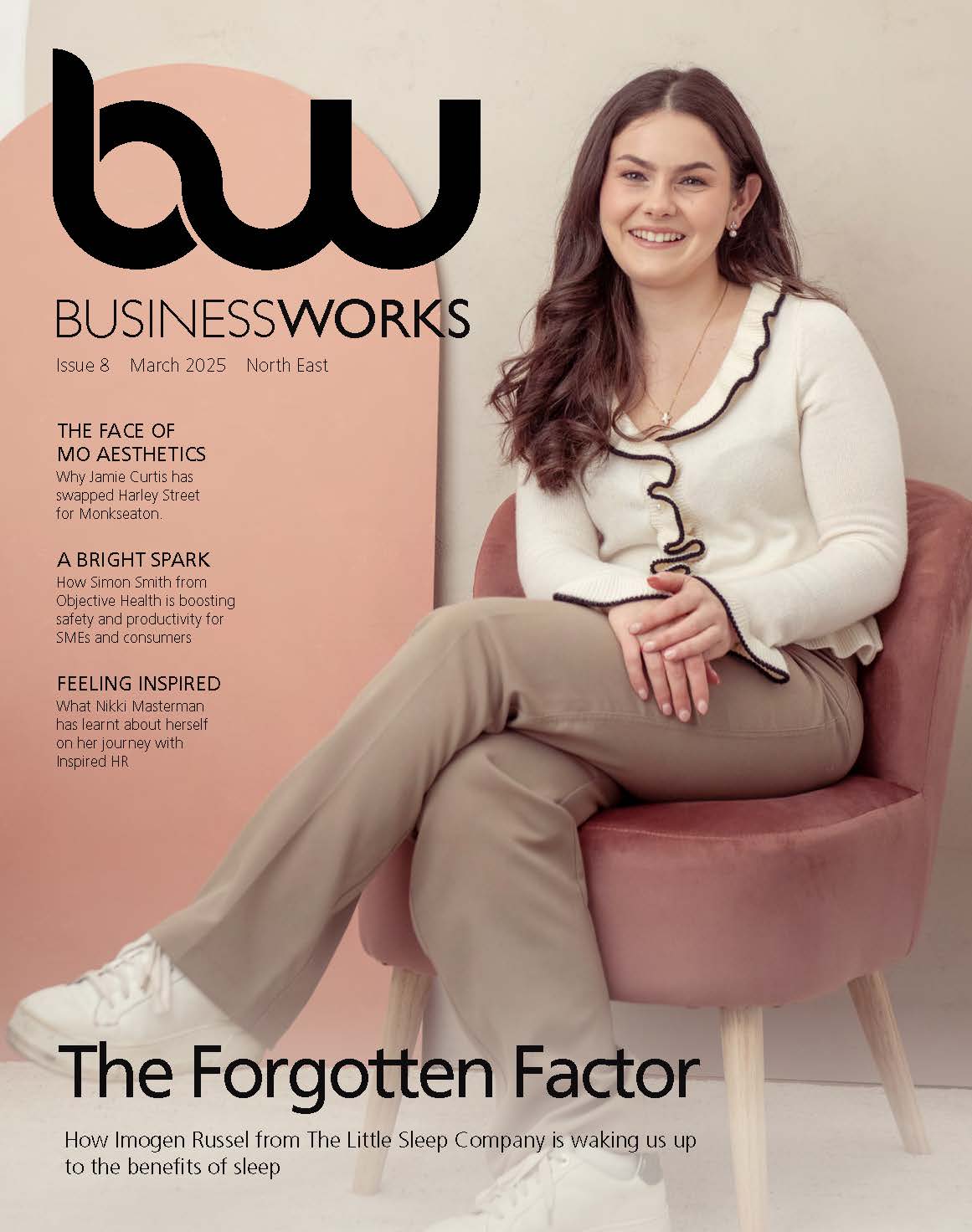Networking can secure new business, build relationships and foster collaboration. But the thought of entering a room of strangers fills many people with dread, and most are happy to leave it to the more extroverted among us. But Jeni Smith, who has spent her career attending, hosting and researching networking, is keen to show that by taking a more strategic approach, it can be an effective tool for everyone, as she tells Alison Cowie.
It was the local shop in her home village of Wetheral that proved the catalyst for Jeni Smith to study business and finance at university.
“I used to spend my 50p pocket money at the pick ‘n’ mix section,” she recalls. “I dreamt of one day having a shop just like it.
“It was the reason that I decided to do business at uni – what better reason than sweets!”
Jeni was an industrious child who played classical guitar from the age of six, loved fashion and – following the death of her dad when she was just 10 years old – took up competitive swimming where weekends were spent travelling to galas.
Before university, she took a year off to travel and spent six months living with nuns in Fuji and volunteering at a deaf school.
Jeni attended Liverpool John Moores University and the girl from a small Cumbrian village found the cosmopolitan mix of art and food in the then European City for Culture intoxicating.
In her second year, Jeni began work experience at local CGI, animation and games company Milky Tea Studio. It was the company’s co-founder, Jonathan Holmes, who took the young student to her first networking event.
“Jonathan told me to say I worked in business development but I didn’t really understand what Milky Tea did. The idea of trying to talk to people about it scared the life out of me and I spent most of the evening hiding in the toilet.”
Despite the nervy start, Jeni was intrigued by networking and its potential benefits.
“It seemed like an amazing way to meet people from different worlds and backgrounds, and learn all about them,” she reflects.
Jeni went to her second networking event a few weeks later. It was focussed on the creative sector and a more informal affair than her first. She plucked up the courage to speak to a fellow attendee.
“I talked to a guy called Livingstone who made furniture. He was more nervous that I was and was so glad I’d spoken to him. We ended up chatting all night.
“From a networking perspective that obviously wasn’t great as I only met one person. But it built my confidence and it was then that I fell in love with networking.”
Jeni started going as many networking events as she could and the more she attended, the more engrossed she became.
“It was like this under-the-surface world and once you took your first step into it, it just opened up.
“I wasn’t very strategic about it at the start. I mainly chose events that had free food! But the more I networked, the more events I got to know about.
“I soon found that I was naturally able to join the dots between people. I’d meet someone and go ‘oh, you need to speak to this person or you need to speak to that person.’
“In the academic world, it’s called ‘social capital’ and it increases your perceived value to others.”
After graduating, Jeni established her own networking business, May Fifteen, as a way to monetise her natural flare for connecting people.
“It was a job that I essentially invented,” she explains. “I had two options. One was to take commissions for introductions, but I didn’t want to do that was it was really hard to monitor and I felt I could easily slip into a trap of only making introduction that paid the best.
“The second option, which I did, was where multiple organisations paid me a monthly fee to network on their behalf. I would attend events, meet and speak to people and, if I identified a beneficial connections, I put them in touch with each other.”
Jeni would attend up to six networking events a day across Liverpool and Manchester, with the monthly fees she charged covering costs such as travel and membership fees.
Her dedication meant she was soon being invited to exclusive, invite-only networking building her social capital further.
“I was out Mondays to Fridays, from first thing in the morning to last at night. By the weekend I didn’t want to speak to anyone. It was hard going, but I absolutely loved it.”
After five hectic years in Liverpool, Jeni moved back home to spend more time with her family. She immediately started looking for networking events in the nearby city of Carlisle but was surprised to find little or no options available.
“I was used to having the choice of so many events but there was only one networking event happening a month.”
Jeni saw an opportunity to pivot her business from attending events to hosting her own.
She launched a programme of regular networking with a monthly membership fee, but admits her new venture got off to a slow start.
“Culturally, everyone in Carlisle felt they knew each other but that meant they didn’t go to events to facilitate new connections. I had to do a lot of work to get people on board and it was difficult for the first year or so.
“Then a couple of larger businesses – Lloyds Motor Group and Armstrong Watson – signed up. That was like a stamp of approval from the locals. From then on, more people started joining.”
Jeni used her considerable networking experience gained in the North West to create four disparate monthly events that appealed to the widest demographic.
A Coffee Club was an informal drop-in event held in the middle of the day, whereas an evening social event allowed people to chat out of work hours over drinks.
The Carlisle Curry Club placed attendees in a table of four and between the starter and the main course, Jeni would move their seats so that they could network with different people.
Finally, a Ladies at Lunch event provided more knowledge transfer with a speaker invited to share their story or discuss a business-related topic.
Jeni also went above and beyond to make her delegates feel as comfortable as possible.
“Consistency was key because that helps make people feel safe,” she explains.
Walking into a networking event, you can feel like the kid at school no one wants to play with. You think everyone here knows each other and you’re the odd one out. It’s a vulnerable position to be in.
“I was all about the little things that made people feel welcome,” Jeni continues. “I made sure that I was there early to welcome people and be the face of the event so that people could ask questions if they needed to.
“I also made sure there was a clearly visible banner at the door so people knew they were in the right place and were comfortable navigate round the space.”
After three years running events in Carlisle, Jeni moved to the North East of England and it wasn’t long before she was back in the world of networking after a chance encounter with the founder of The Mussle Club.
“I tried a ‘regular job’ for a bit but it wasn’t for me. Then I met David Cook, who had founded a business networking group years previous. I literally said to him, ‘I can look after this for you. Please give me a shot’.”
As managing director of The Mussel Club, Jeni revived the long-standing business network by expanding the number of events over a wider area. She also grew the types of events, launching evening ticketed events at Newcastle’s newest event space, The Biscuit Rooms.
“Historically, The Mussel Club had always been about free breakfast events – which were great and we added additional locations for those – but we did ticketed evening events too that changed the dynamic. We had some amazing speakers come and share their stories and they proved really popular.”
After almost three enjoyable years at The Mussel Club, the hefty demands and long hours meant Jeni started looking for her next role. She saw an vacancy at Sunderland Software City as a business support specialist.
After successfully applying, Jeni working closely with a range of entrepreneurs, startups and SMEs.
“I’d always loved working with smaller businesses. It was a real learning curved but I got to know all about the world of tech.”
One day, the CEO of Sunderland Software City, David Dunn, saw a rough diagram Jeni had drawn for a company she worked with detailing the different networking events and how personal characteristics suited which ones.
“David saw the doddle I’d done and said, ‘you’ve got a hypothesis there, you need to get it researched’.”
Jeni followed her boss’s advice and got in touch with Durham University. She was ecstatic when the Business School wanted to use it as a research project for its MDA students.
As a result of the students’ research, Jeni wrote a white paper on how a more strategic approach to networking could yield far better results.
Her experience with Durham University Business School reignited a passion in Jeni and while she was on maternity leave with her daughter she took the dramatic decision to leave Sunderland Software City and start her own networking consultancy.
She documented her journey in a regular vlog to help inform people who were thinking of starting their own enterprises. In it, she was able to show how the business and person can quickly become entwined, and along with revealing her business highs, she also shared the devastating news that she had suffered a miscarriage.
“Running your own business seeps into your whole life. They’re not separate and I wanted to show that.
“I was overwhelmed by how many people got in touch after sharing the news that we’d lost our baby. Working on your own business can be isolating but the support that I got from people was wonderful. It showed the importance of having that network.”
For NetKno, Jeni wanted to build on the academic research she had commissioned, breaking down her services into three distinct areas.
NetKno-Why offers consultancy services where Jeni works with companies to find out why they going networking and what they want to achieve. She then creates a strategy based on these objectives and using the local networking ecosystem available.
“For example, a lot of new businesses go to free events but they tend to attract other startups, which may not be the target market you’re looking for,” Jeni explains. “It might be, your networking activity is better focused at events with membership fees, where more established businesses will be.
“It’s all about looking at in detail at the type of the event. Even things like who is hosting and the speaker will give an indication if it’s right for you.”
For NetKno-How Jeni provides networking training and workshops to help empower people with practical networking skills.
She works with individuals, academics and companies but has recently started working more in schools to help 16 to 18 year olds, who are used to communicating through their phones, build more interpersonal skills.
Finally, Jeni is working on a new SaaS platform, known as NetKno-Where, which details networking event happening in the region.
“There’s a freemium option where people can look at what’s happening. Or, for a fee, people will get their own bespoke dashboard where they can be more strategic about the events that will benefit them the most.”
Jeni sees the benefits of virtual networking as cost effective way to reach a wider network in wider locations, but she maintains it won’t replace face-to-face networking, and a blended approach will be more beneficial to most individuals and organisations.
Last year, Jeni also decided to take her academic research in the anatomy of networking to the next level by enrolling at Durham University Business School to complete a part-time PhD in networking while running NetKno.
Her aim with the PhD – which she will complete in 2026 – is to delve even further into the science of networking that will ultimately inform the work she delivers through her consultancy, training and SaaS platform.
“In my PhD research, I’m looking at the anatomy of networking events and how all those little things – such as the time of day, location, speakers, etc – come together and impact who attends an event and who doesn’t.
“I want to create new knowledge around how those events can be better designed to be more inclusive and more accessible.”
Jeni has come a long way from hiding in the toilets to become a virtuoso networking strategist.
For more information visit www.netkno.co.uk





